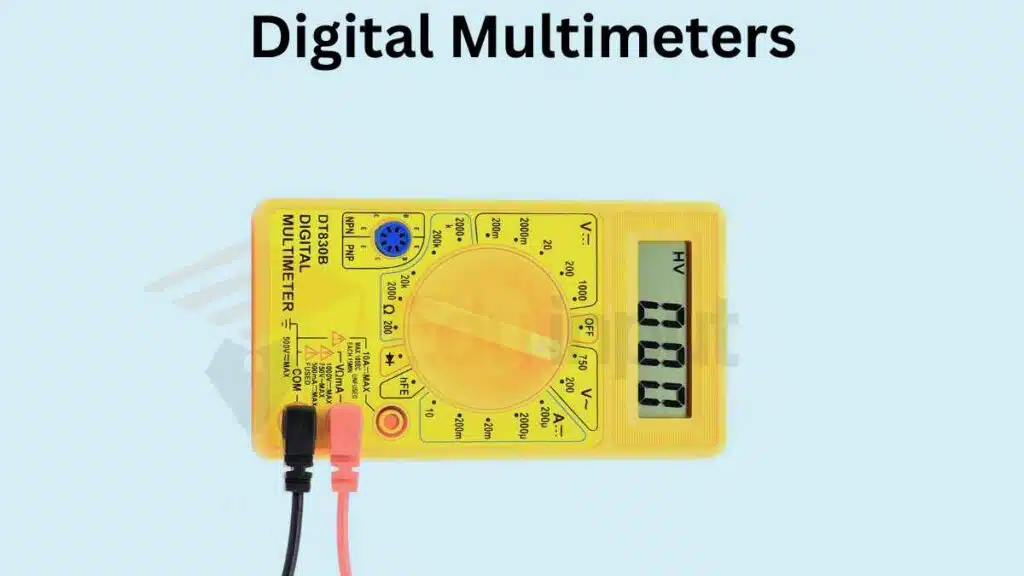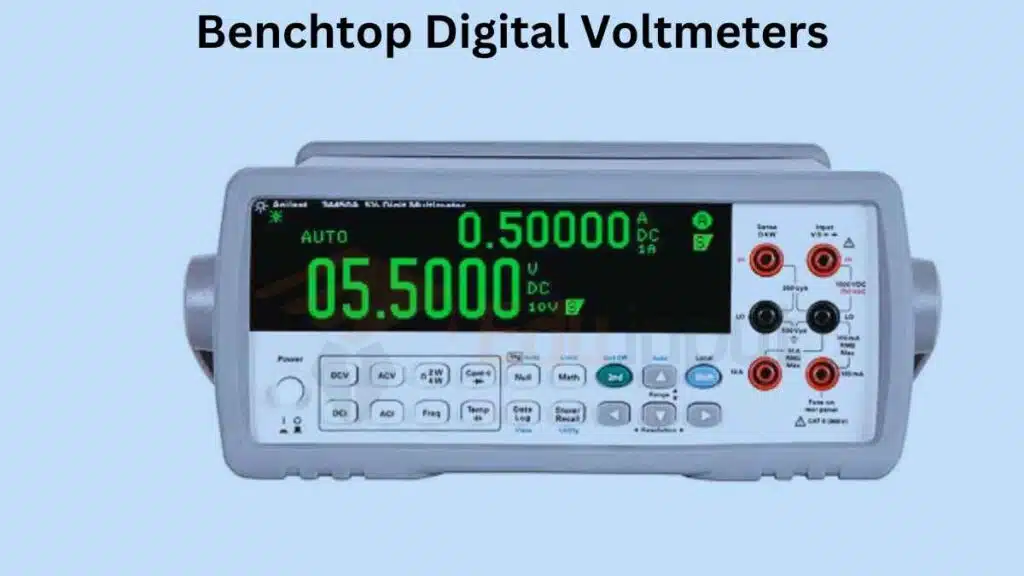Digital Voltmeter-Definition, Working, Types, And Applicaions
What is Digital Voltmeter?
A digital voltmeter is a measuring device that displays voltage readings in a digital format. It is designed to measure both direct current (DC) and alternating current (AC) voltages. The primary purpose of a digital voltmeter is to provide accurate voltage measurements in various electrical and electronic applications.
A digital voltmeter is a type of voltmeter that provides precise numerical readouts of voltage values. It offers several advantages over traditional analog voltmeters including enhanced accuracy, readability, and additional measurement capabilities.
Digital voltmeters have revolutionized the way we measure and monitor electrical voltage. With their advanced technology and user-friendly features, they have become an indispensable tool for professionals.
How Does Digital Voltmeter Work?
Digital voltmeters rely on the principle of analog-to-digital conversion to measure voltage levels accurately. Here’s a brief overview of how digital voltmeters work.
Analog-to-Digital Conversion
When a voltage is applied to a digital voltmeter, it first converts the analog voltage signal into a digital format. This conversion process involves sampling the analog signal at regular intervals and representing the voltage values as discrete digital numbers. The accuracy and resolution of a digital voltmeter are determined by the number of bits used for the analog-to-digital conversion.
Display Types (LCD, LED, OLED)
Digital voltmeters utilize different display technologies to present the measured voltage values. Common display types include Liquid Crystal Displays (LCDs), Light Emitting Diodes (LEDs), and Organic Light Emitting Diodes (OLEDs). LCD displays offer good readability and are commonly found in various digital voltmeters. LED displays provide bright and clear numerical readouts, while OLED displays offer excellent contrast and wide viewing angles.
Types of Digital Voltmeters
Digital voltmeters come in various types, each catering to specific needs and applications. Let’s explore some of the commonly used types of digital voltmeters.
Digital Multimeters (DMMs)
Digital multimeters also known as DMMs are the most common type of digital voltmeters. They combine multiple measurement functions, including voltage, current, resistance, capacitance, and continuity, into a single device. DMMs are portable and widely used in various industries, ranging from electronics and telecommunications to automotive and electrical maintenance.

Clamp Meters
Clamp meters also referred to as clamp-on meters or current clamp meters, are digital voltmeters specifically designed to measure AC or DC current. They incorporate a current sensor that clamps around the conductor to measure the current flowing through it. In addition to current measurements, clamp meters can also measure voltage and resistance.

Benchtop Digital Voltmeters
Benchtop digital voltmeters are larger, stationary units often found in laboratories and professional settings. They offer higher precision and advanced measurement capabilities compared to handheld devices. Benchtop digital voltmeters are commonly used in research, development, and testing environments where accurate voltage measurements are critical.

Features and Functions of Digital Voltmeters
Digital voltmeters come with a range of features and functions that enhance their usability and versatility. Let’s explore some of the key features commonly found in digital voltmeters.
Voltage Ranges and Resolution
Digital voltmeters support multiple voltage ranges to accommodate a wide range of measurement requirements. The voltage range determines the maximum and minimum voltage levels that can be accurately measured.
The resolution of a digital voltmeter refers to the smallest voltage increment it can detect. A higher resolution enables more precise measurements, especially when dealing with small voltage changes.
Auto-ranging and Manual-ranging
Some digital voltmeters offer auto-ranging capabilities, where the device automatically selects the appropriate voltage range based on the input signal. This feature simplifies measurements by eliminating the need for manual range selection.
On the other hand, manual-ranging voltmeters require users to manually choose the appropriate voltage range, providing more control over the measurement process.
Additional Measurement Parameters
Many digital voltmeters extend their functionality beyond voltage measurements. They incorporate features to measure other electrical parameters like resistance, current, and frequency.
This versatility allows users to perform a wide range of electrical tests and diagnostics using a single device, reducing the need for multiple instruments.
Benefits of Digital Voltmeters
Digital voltmeters offer several benefits that make them preferable to analog voltmeters. There are some of the key advantages of using digital voltmeters.
Accuracy and Precision
Digital voltmeters provide higher accuracy and precision compared to analog voltmeters. The numerical readouts eliminate interpretation errors and provide precise voltage measurements. Additionally, digital voltmeters often have better resolution, allowing them to detect smaller voltage changes.
Ease of Use
Digital voltmeters are generally user-friendly and easy to operate. They provide clear numerical displays, making it easier to read and record voltage values. The presence of dedicated function buttons and intuitive interfaces simplifies the measurement process. Many digital voltmeters also offer features like hold functions and backlit displays for added convenience.
Versatility and Portability
Digital voltmeters come in various sizes and designs, offering portability and flexibility. Handheld digital voltmeters are lightweight and compact, making them suitable for on-site measurements and fieldwork. They can be easily carried in toolkits or pockets. Additionally, the versatility of digital voltmeters, with their ability to measure multiple parameters, eliminates the need for carrying multiple instruments.
Safety Features
Digital voltmeters often incorporate safety features that protect both the user and the instrument. These features may include overload protection, input voltage protection, and fuse protection. Some digital voltmeters also have non-contact voltage detection capabilities, allowing users to identify live circuits without direct contact, enhancing safety during electrical measurements.
Applications of Digital Voltmeters
Digital voltmeters find applications in various fields where voltage measurements are essential. There are some common areas where digital voltmeters are widely used.
Electronic Testing and Troubleshooting
Digital voltmeters are extensively used in electronic testing and troubleshooting. They help engineers and technicians analyze and diagnose circuit problems, measure voltage levels in different components, and ensure the proper functionality of electronic devices.
Circuit Design and Prototyping
Digital voltmeters play a crucial role in circuit design and prototyping. They help engineers measure and verify voltage levels at different stages of the design process. By providing accurate voltage readings, digital voltmeters assist in ensuring the circuit operates within the desired specifications.
Electrical Maintenance and Inspection
Digital voltmeters are valuable tools for electrical maintenance and inspection tasks. They aid in identifying faulty connections, measuring voltage drops, and assessing the performance of electrical systems. Electricians and maintenance personnel rely on digital voltmeters for routine inspections, repairs, and preventive maintenance.
Renewable Energy Systems
With the growing demand for renewable energy sources, digital voltmeters find application in the field of solar and wind energy systems. They help monitor voltage levels in solar panels, wind turbines, and energy storage systems, ensuring optimal performance and efficient energy conversion.
Related FAQs
How accurate are digital voltmeters?
Digital voltmeters offer high accuracy, typically within a specified percentage of the full-scale reading. The accuracy may vary depending on the model and brand of the digital voltmeter.
Can digital voltmeters measure AC voltage?
Yes, digital voltmeters are capable of measuring both direct current (DC) and alternating current (AC) voltages. They often provide separate measurement modes for DC and AC voltage measurements.
Can digital voltmeters measure current directly?
Digital voltmeters are primarily designed to measure voltage. However, some advanced models offer current measurement capabilities by incorporating current measurement accessories such as current probes or current shunts.







Leave a Reply